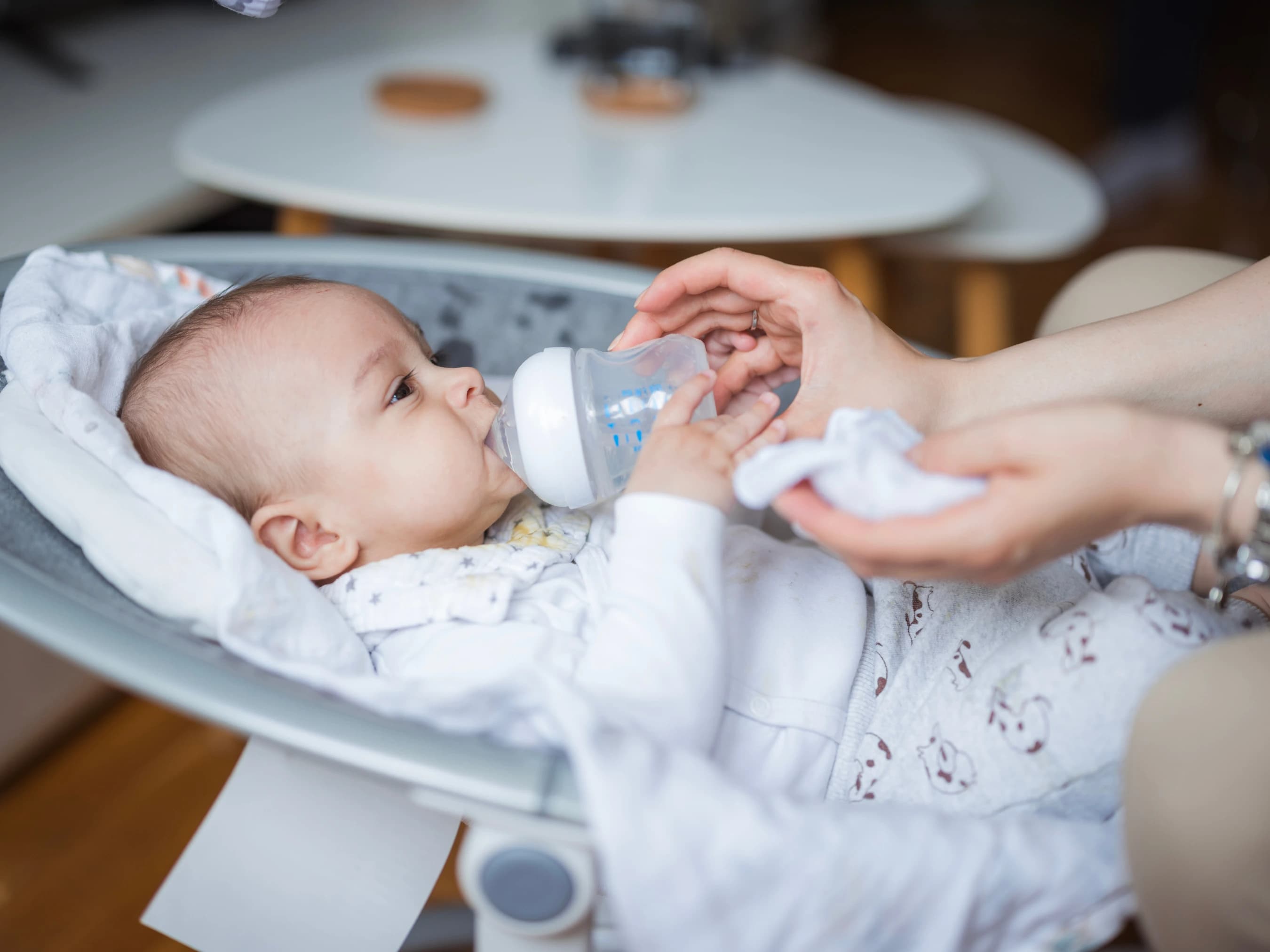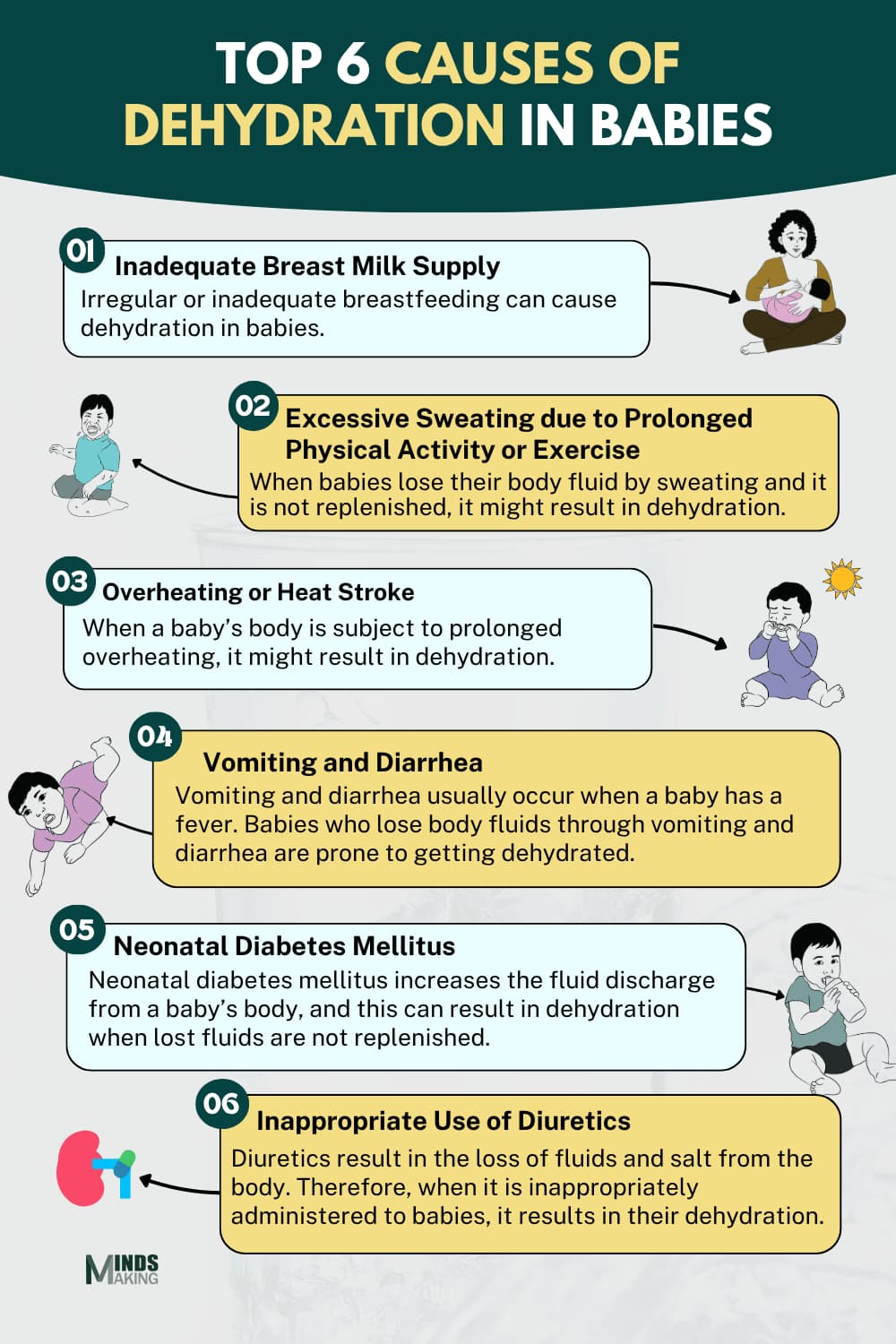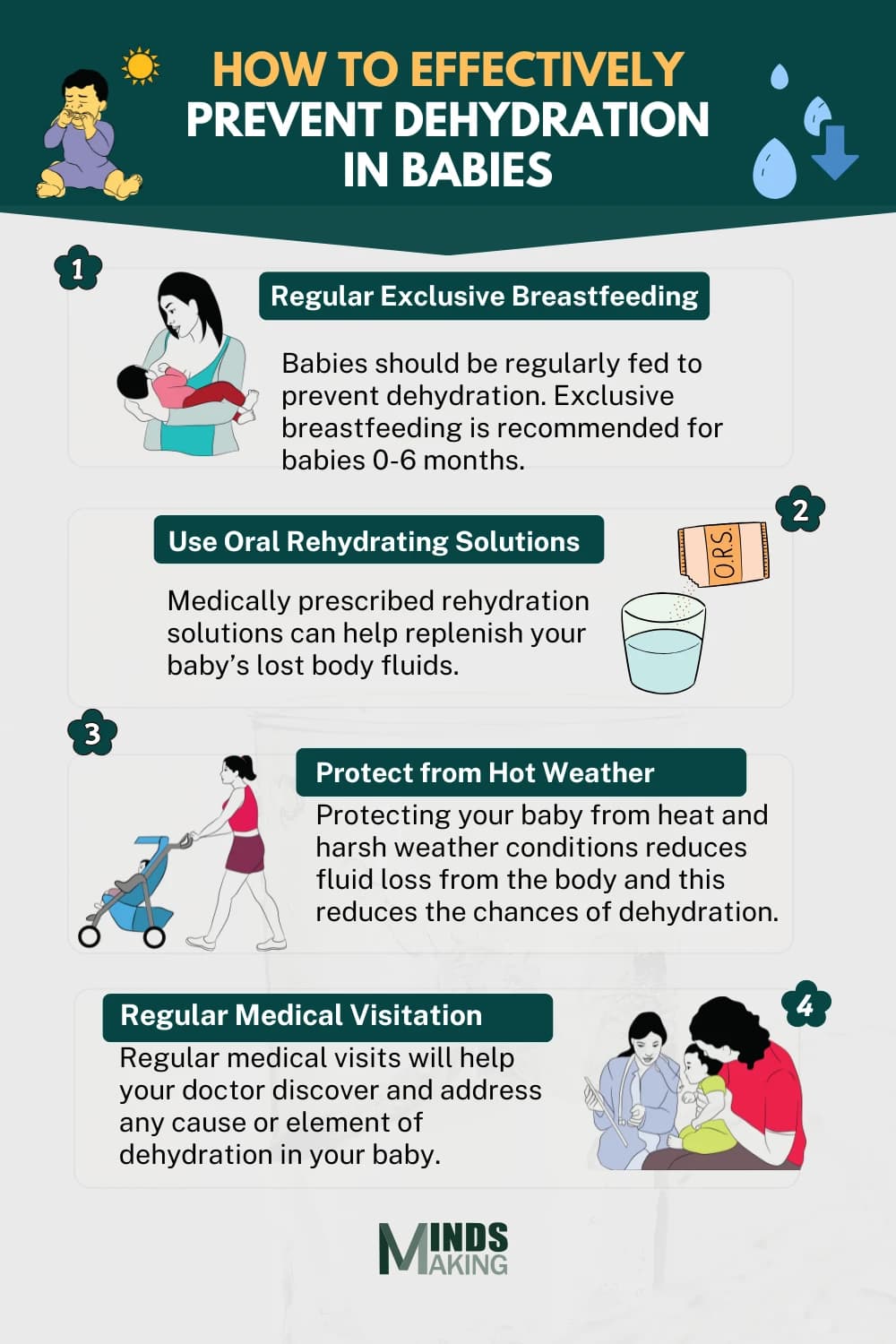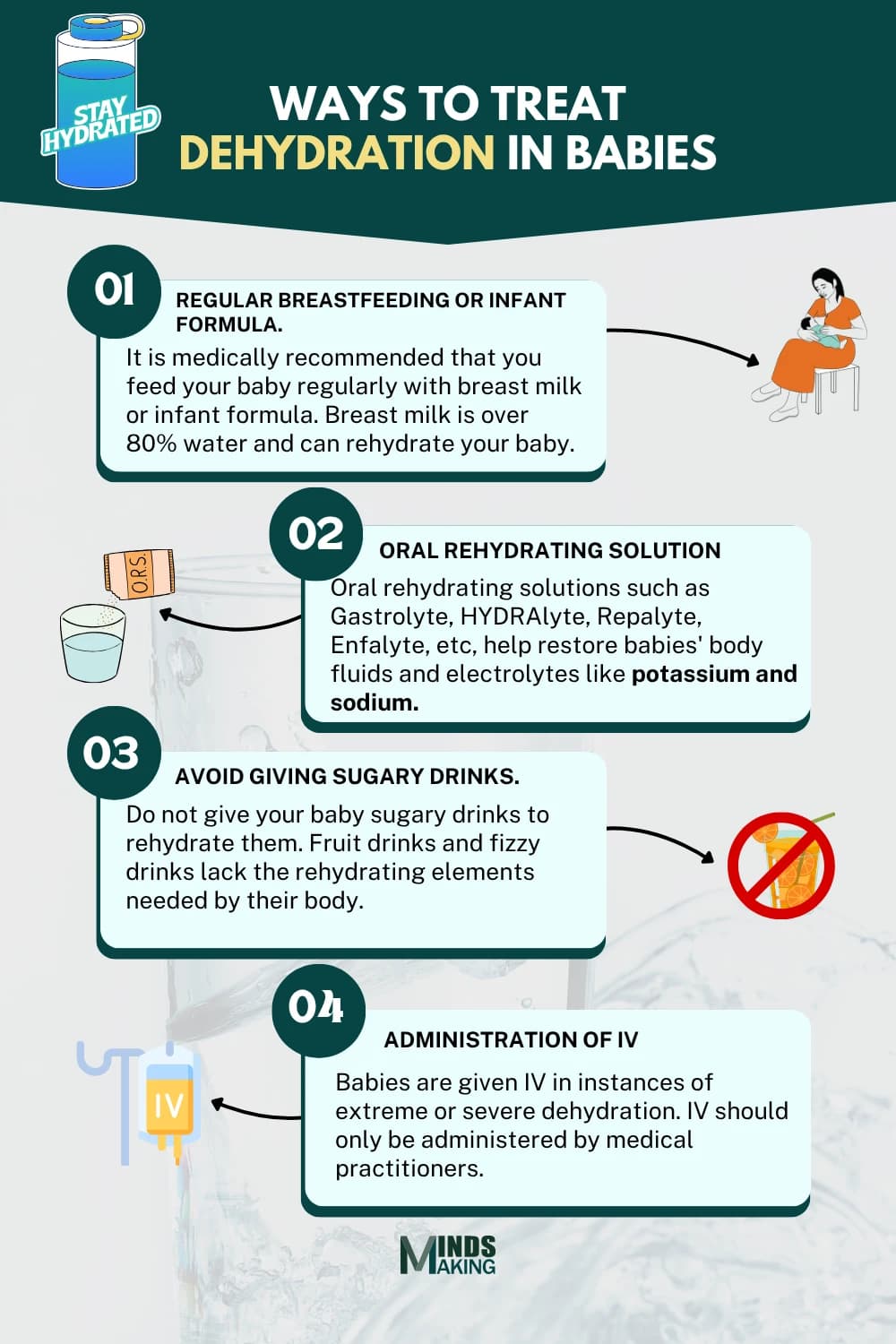Dehydration in Babies
Getty Image Signature

Written by Mindsmaking Medical Writer
Fact Checked by Mindsmaking Professionals
18th, November, 2025
The early discovery of dehydration in babies helps prevent medical complications. Understanding the causes, prevention, and treatment of dehydration in babies will help keep your baby hydrated and healthy.
Dehydration has been identified as a leading cause of infant mortality, making it vital to recognize its causes, symptoms, methods of prevention, and appropriate treatments (3).
In babies, dehydration is particularly concerning because their bodies are small and sensitive, making them more vulnerable to fluid loss. It goes beyond simply feeding them breast milk or infant formula — it’s about ensuring they receive enough fluids and electrolytes to support their developing systems.
Key Takeaways
Dehydration in babies, a leading cause of infant mortality, occurs when the body loses more fluids and electrolytes than it takes in
Both breastfed and formula-fed babies require adequate fluids and electrolytes to stay hydrated. Breastfeeding is recommended for at least the first six months, while formula must be carefully prepared to ensure proper nutrition.
Dehydration in babies can result from inadequate breast milk supply, excessive sweating, overheating, vomiting, diarrhea, neonatal diabetes mellitus, or improper use of diuretics
Some signs of dehydration in babies are inadequate feeding, signs of infection, persistent vomiting or diarrhea, or if symptoms do not improve within a few days.
Preventing dehydration in babies involves replenishing lost fluids through regular breastfeeding or formula feeding, protecting them from heat, monitoring diaper wetness, and ensuring they are fed every 2–4 hours to maintain proper hydration.
Parents must actively prevent dehydration in babies by ensuring regular breastfeeding or formula feeding, using oral rehydration solutions for mild cases, avoiding sugary drinks, and seeking medical intervention in severe cases.
While mild dehydration in babies can be managed with breastfeeding or rehydration solutions, you should seek medical attention if your baby does not respond to home remedies.
What is Dehydration in Babies?
Dehydration in babies goes beyond feeding your babies with breast milk or infant formula. It involves ensuring that babies have sufficient fluid and electrolytes their fragile bodies need to run effectively.
Understanding dehydration in babies is essential since they cannot effectively communicate their hydration needs. Therefore, you must ensure they are well-hydrated and healthy.
According to the National Health Service, dehydration occurs when your body loses more fluid than it takes in. Additionally, according to a publication by Dr.Liji Thomas, Dehydration is a condition where the body lacks its normal complement of water and electrolytes. (1) (2)
Dehydration has been highlighted as a leading cause of infant mortality. It is, therefore, essential to understand the causes, signs, prevention, and treatment of dehydration in babies. (3)
Causes of Dehydration in Babies
There are various causes of dehydration in babies. These causes highlight what makes babies lose more fluids than they consume. Babies must be well-fed to ensure they remain hydrated. Inadequate breastfeeding or formula feeding is the leading cause of dehydration in babies. However, there are other causes of dehydration in babies. (1)
Inadequate Breast Milk Supply: Breast milk is essential for the adequate mental, physical, and overall well-being of a baby. Therefore, when a child does not receive sufficient breast milk, they might be dehydrated.
After the birth of a baby, they might experience some difficulty latching onto their mother’s nipple or sucking a nipple or bottle properly and this might result in their dehydration. Also, not all mothers produce sufficient breast milk, and this affects the feeding of their babies, resulting in dehydration.
Excessive Sweating due to Prolonged Physical Activity or Exercise: Sweating is one of the major ways of losing body fluid. Therefore, when babies lose their body fluid by sweating and it is not replenished, it might result in dehydration. Losing bodily fluids through sweat pores is very common in babies.
Overheating or Heat Strokes: Hot weather conditions are the major causes of overheating and this results in dehydration in babies when they are not protected. When babies are dressed in unbreathable fabrics, warm clothes, or thick blankets,especially in hot weather, it might result in their dehydration. When a baby’s body is subject to prolonged overheating, it might result in dehydration.
Vomiting and Diarrhea: Vomiting and diarrhea usually occur when a baby has a fever. Babies who lose body fluids through vomiting and diarrhea are prone to getting dehydrated, especially when the fever reduces their desire to eat. Vomiting and diarrhea in babies result in weakness and tiredness, which are two of the major signs of dehydration in babies.
Neonatal Diabetes Mellitus: This occurs in the first 6 months of an infant’s life. This affects their body’s insulin production and results in high glucose levels in babies. Neonatal diabetes mellitus increases the fluid discharge from a baby’s body, and this can result in dehydration when lost fluids are not replenished. (4)
Inappropriate Use of Diuretics: Diuretics are also referred to as water fluids. Diuretics are usually administered to infants or premature babies whose kidneys are not functioning properly. Diuretics result in the loss of fluids and salt from the body. Therefore, when it is inappropriately administered to babies, it results in their dehydration.

Early Signs of Dehydration in Babies
Early discovery of dehydration in babies is important because it helps prevent medical complications. There are certain signs of dehydration that parents must check to detect
dehydration in their babies. Some of the early signs of dehydration in babies are:(5) (6)
- A sunken soft spot.
- Sunken eyes.
- Crying with little or no visible tears.
- Excessive sleeping.
- Dry lips or mouth.
- Dark yellow or brown urine.
- Cold hands and feet.
- Constant tiredness and Crankiness.
- Dry Nappies for over 6 hours
- Rapid breathing.
- Rapid heart rate.
Read This Next
No posts available
Dehydration in Breastfed vs. Formula-Fed Babies
It is important to note that both formula-fed babies and breastfed babies need an accurate quantity of fluids and electrolytes to stay hydrated. The quantity and the quality of breast milk or formula digested by these babies determine whether they will be dehydrated or not. Breast milk and formula have their nutritional complement to help keep your baby hydrated.
Medical institutions, especially the American Academy of Pediatrics (AAP), recommend exclusive six months of breastfeeding for babies after their birth. Breastfeeding is good for the mother and the baby’s health. According to the World Health Organization (WHO), breast milk contains 80% water, so you can be well assured that a well-breastfed baby is well hydrated. (7) (8)
Nevertheless, it is important to state that a breastfed baby could turn out to be dehydrated. This usually happens when the mother does not produce sufficient milk to feed and hydrate her baby. Additionally, breastfed babies could also be dehydrated when they are not given water 6 months after their birth.
Babies aged 6 months and above are more active and tend to have more baby fluid loss. Water (9) is a good complement to keep them hydrated. Please note that the water introduced should not replace their milk or formula intake, as that is their main source of nutrients.
On the other hand, there are various reasons why a mother can choose to use formula instead of breast milk. Formula-fed babies are also well-hydrated, provided they are neatly prepared and contain the right nutrients for your baby’s growth. However, trying to save costs and preparing a homemade formula might affect your baby’s hydration level and overall health. (10)
Unlike breast milk, which naturally has all the elements necessary to keep your baby hydrated and healthy. If you are using infant formula, ensure that it is nutritious and that your baby is well-hydrated. Don’t buy random store formulas, ensure that they are medically approved or prescribed by your doctor.
There are certain risks associated with the process of preparing baby formula. Thus, ensure that you prepare your baby’s formula in a very sterile condition. Also, it is advised that you get a medically prescribed formula for your baby, not homemade or random store formula.
Whether you use breast milk or formula for your baby, ensure that your baby is well-hydrated and healthy. The cost of treating the aftermath of dehydration is more expensive than the process of ensuring that your baby is well-hydrated.
How to Prevent Dehydration in Babies
The dangers associated with dehydration in babies make it essential to prevent them from getting dehydrated. To prevent dehydration in babies, the fluids lost either through sweat, diarrhea, or vomiting must be replaced. When your baby has sufficient fluid and electrolytes needed for their body function, the baby will not be dehydrated.
Oral Rehydrating Solutions
If your baby has a fever that results in diarrhea or vomiting, the lost fluids must be replaced. A medically prescribed rehydrating solution will also help rehydrate babies with fever or diarrhea (18). Vomiting or diarrhea by itself will not cause dehydration. However, dehydration occurs when the fluids lost by vomiting are not replaced. Oral rehydrating solutions are a good way to replenish lost fluids.
Avoid Overheating
You must ensure that the hot weather does not dehydrate your baby. A cool playground will protect your baby from heat and sun. Dress them in light clothes during this period to prevent dehydration. When interaction with harsh weather is inevitable, replenish lost fluids through regular breastfeeding or formula feeding.
Regular Breastfeeding
Regular breastfeeding is one of the easiest ways to prevent dehydration in babies. Once you notice that your baby's nappies are not as wet as they used to be, it is your cue to keep them hydrated through regular feeding. An average of 2-4 hours feeding interval will ensure they are well fed and hydrated (12)
Regular Medical Visit
Medical visitation should not only be scheduled when your baby has a fever or when they are already showing signs of dehydration. Regular medical visits will help your doctor discover and address any cause or element of dehydration in your baby. One of the causes of dehydration in babies is insufficient lactation and in most cases, mothers are not aware of it. Regular medical visits will help address issues relating to lactation and dehydration in your baby.(13)

Top 4 Tips on How To Treat Dehydration in Babies
Parents and guardians are responsible for ensuring that their babies are not dehydrated. Nevertheless, there are certain instances where babies still suffer from dehydration. Once you discover the presence of some or all of the signs of dehydration in your baby, you must promptly take action to rehydrate them to avoid complications.
Regular Breastfeeding or Infant Formula
One of the best fluids to rehydrate your baby is breast milk. You can also feed them with formula if that is what they take. It is medically recommended that you breastfeed your baby regularly. You should know that over 80% of breast milk content is water, therefore, your breast milk is enough to keep them hydrated. (8) If you have been breastfeeding your baby regularly and they are still dehydrated, try increasing the breast milk you give them per intake.
Oral Rehydrating Solution
This is usually a good treatment for kids who are mildly dehydrated and are older than 6 months. (14) Once you notice they are dehydrated, you can introduce oral rehydrating solutions such as Gastrolyte, HYDRAlyte, Repalyte, Enfalyte, etc, to restore their body fluids and salt(15). A rehydrating solution will help restore lost body fluids and electrolytes like potassium and sodium.
Avoid giving Sugary Drinks
It is important to note that while trying home remedies for babies older than 6 months, drinks that are high in sugar should be avoided. Giving your baby fruit juice or fizzy drinks might complicate their health so
Intravenous Administration
This usually occurs in extreme instances. This is not a home remedy and should not be administered to your baby by non-medical practitioners. Ensure that you observe your baby regularly to prevent extreme dehydration. Before IV administration, other mild remedies such as breastfeeding, liquid intake, and rehydrating solution would have been tried.

When to See A Doctor About Dehydration in Your Baby.
For many parents and guardians, visiting a doctor is their immediate course of action once they notice any slight changes or discomfort in their baby. This helps prevent medical complications. However, there is nothing wrong with trying to personally attend to the mild discomfort you notice in your baby. However, you must know when to reach out to a doctor, especially if you are experiencing dehydration.
Refusal to drink breast milk or formula
Breast milk or formula is important to keep your baby hydrated. However, if you notice that your baby is having difficulty sucking or drinking the breast milk or formula, you need to see a doctor before it escalates. Newborns have a little bit of a struggle getting accustomed to sucking nipples or eating from a bottle, but they ought to have got it figured out after a day or two. If your baby is not eating well, dehydration is almost inevitable.
Persistent vomiting or diarrhea
Babies are susceptible to infections because of their weak immune system. It is medically advised that access to newborns is reduced to prevent infection. If your baby is vomiting or has diarrhea, it might be a sign of infection. Vomiting and diarrhea are the fastest way to get a baby dehydrated. If your baby’s vomit is bright green, brown, or red, you should inform your doctor. So, in this instance, take your baby to see a doctor immediately. Do not wait to see whether they get better, let your doctor examine their health.(6)
Extreme Dehydration
In the instance of mild dehydration, it is advised that you try a homemade remedy like regular breastfeeding or an oral rehydrating solution for a few days. If their changes from mild to severe dehydration, then you need to see a doctor. Homemade remedies should improve your baby’s health, however, if there is no improvement, visit your doctor.
Coloured Urine or Dry Nappies
Every little move, cry, burning up, and tear should be closely monitored because they are symptoms that will help monitor your baby’s health. If you notice that your baby has a dark coloured urine then you need to see your doctor. If they have dry nappies, it means they are not getting enough fluid and you might need to see a doctor. (5)
Frequently Asked Questions
How do I know if my baby is dehydrated?
Different signs and symptoms of dehydration will help you know if your baby is dehydrated. If your baby is very active but has suddenly become quiet, you should check him/her out for some symptoms of dehydration. One of the major symptoms of dehydration in babies is when their nappies are always dry. Other symptoms that will help you know if your baby is dehydrated are dry lips and mouth, crying with little or no tears, darker urine shade, cold feet and hands, sunken soft spots and eyes, skin discoloration, etc
Can breastfeeding alone prevent dehydration?
Breastfeeding helps keep babies hydrated since breast milk is about 80% water. Feeding every 2–4 hours is usually enough. However, babies can still get dehydrated from diarrhea, vomiting, or heat. In such cases, breast milk may need to be supplemented with oral rehydration solutions, as advised by a doctor.
What should I do if my baby refuses to drink?
If your baby refuses to drink, it might be a sign of a fever or a sore throat. Regardless of what it is, take your baby to a doctor once he or she refuses to drink.
How long does it take for a baby to recover from dehydration?
Once you discover that your baby is dehydrated, give them fluids, either breast milk or an oral rehydrating solution (ORS). You should study them for a few hours to see if their body is getting rehydrated. After about a day of addressing the source of dehydration, if there are no changes, then it might be a sign of severe dehydration and you should take them to a doctor
Can teething cause dehydration in babies?
Teething is one of the many phases that babies experience while growing up. While teething cannot directly cause dehydration, it can result in some discomfort that makes a baby dehydrated. Babies respond to teething differently. For some, they develop fever or even lose appetite and reject breast milk. Dehydration would only happen if the teething phase causes your baby to lose more fluid than they take in.
What foods help prevent dehydration in babies?
Breast milk helps prevent dehydration in babies. Ensure that you breastfeed your baby regularly to keep them hydrated. Breast milk is 80% water and contains all the nutritional components to keep your baby hydrated. Water is also an essential element needed by the body to prevent dehydration, especially for babies on formula or babies past the age of exclusive breastfeeding.
When should I take my baby to the doctor for dehydration?
When your baby shows signs of severe dehydration, you should see a doctor to prevent complications. Severe dehydration is not easily treated at home. Some signs of extreme dehydration are sunken eyes, a sunken soft spot, fainting, paleness, rapid breathing, etc
Was this article helpful?
How many stars are you giving this article?
Leave a comment
Your email address will not be published.